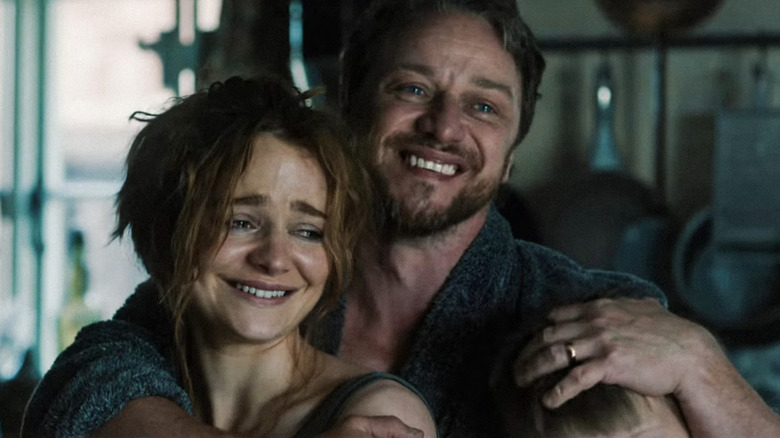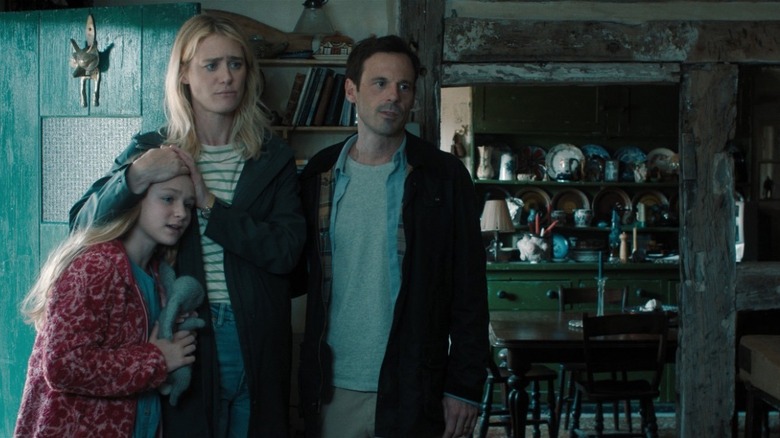Speak No Evil Remake Director Explains Why The Ending Is So Different From The Original [Exclusive]
This article contains mild spoilers for "Speak No Evil."
When Blumhouse first announced that they would be remaking Christian Tafdrup's "Speak No Evil" from 2022, horror fans were bewildered about the possibility of a major American studio release daring to tackle one of the bleakest horror films in recent memory. It's the type of movie that genuinely earns the title of "shocking" without a hint of exaggeration, but calling the film's final moments "dismal [complimentary]" is an understatement. Fortunately, Blumhouse brought in writer/director James Watkins ("Eden Lake," "Black Mirror," "The Woman in Black") who is well-versed in gut-punch storytelling, and he more than delivered with his Americanized remake. Ahead of "Speak No Evil" finally hitting theaters, I had the opportunity to interview the film's star James McAvoy as well as Watkins to learn more about their approach to the remake. Most importantly, I wanted to know how Watkins decided what to keep from the original and what to change.
The new film follows an American couple named Ben and Louise Dalton (Scoot McNairy and Mackenzie Davis) who are invited to visit the home of Paddy and Ciara (James McAvoy and Aisling Franciosi), an eccentric couple from the UK they met while vacationing in Italy when Ben and Louise's daughter Agnes (Alix West Lefler) became friends with Paddy and Ciara's son Ant (Dan Hough). After the Daltons arrive at the isolated country home, it becomes very clear that Paddy and Ciara are not who they seem, and the Americans are thrust in a fight for their lives against unpredictable maniacs.
"I definitely wanted to go somewhere different in the third act," Watkins tells me. "Because for me, once the cat's out of the bag ... the point where Paddy says, 'Because you let us,' [that's a] theme of the movie." This line was pulled directly from the original film, and serves as almost the "Because you were home" ethos of "The Strangers."
The difference in American responses
The 2022 film shows the unsuspecting couple submitting to the sadistic cruelty of their new "friends" until the very end, while "Speak No Evil" 2024 features the couple pushing back. "In my mind, particularly with these American characters, I felt that once it was all out there and it's no longer about politeness — when you're confronted with a gun — I felt these characters, Ben and Louise, they've got to at least try to do something," says Watkins. "To run, to hide, to whatever. I thought that was an American mindset."
Watkins is right. The unfortunate reality is that given the constant threat of gun violence in America, many of us have developed a subconscious practice of risk assessment with every new person we meet. "When confronted with mortal danger and their child, I wanted that, but also, I wanted to say, thematically, a different thing, which is, there is polite society and that theme, but the converse of polite society is that none of us really are used to violence," he elaborated. He's right again. We might be aware of the constant threat of violence, but until it happens to us directly, can we ever truly be prepared? He questions, "In our civilized world, when we're confronted with violence, how do we react?"
This thought process allows "Speak No Evil" to become not just a successful horror thriller, but also a thought exercise for the audience at home. Would you ignore red flags for the sake of politeness? Will a gun be what makes you recognize the severity of a situation? As much as we in the audience think we know what we'd do in a similar situation, until we're actually there, there's no way of predicting how we'll respond.
We spoke about "Speak No Evil" on today's episode of the /Film Daily podcast, which features my full interviews with Watkins and McAvoy:
You can subscribe to /Film Daily on Apple Podcasts, Overcast, Spotify, or wherever you get your podcasts, and send your feedback, questions, comments, concerns, and mailbag topics to us at bpearson@slashfilm.com. Please leave your name and general geographic location in case we mention your e-mail on the air.

